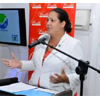JN Foundation Drives Financial Literacy
In its bid to contribute to the development of a more financially literate country, the JN Group, through the JN Foundation, has successfully devised and implemented an enabling programme to help Jamaicans achieve financial security.
The Financial Empowerment programme, which is in its second year, aims to teach the core principles of money management and to expose participants to the tools necessary in their quest to improve their financial status, stability and independence.
Officially launched in 2015, the empowerment programme’s genesis is linked to the theory that saving and investment play a pivotal role in empowering individuals as well as for the enhancement of the country’s economy.
Led by Rose Miller, project manager for financial literacy at the JN Foundation, the presentations are prepared and delivered to adults and children in an interactive manner.
“We have targeted students, because we recognise the importance of ensuring that our children are financially smart from an early stage. And we reinforce the importance of not only making wise financial choices and effectively managing money, but also the necessity of taking responsibility for their financial education. Practical ways in which each person can work towards their financial goals and the rewards to be gained are also emphasised throughout the programme,” Miller said.
Concomitantly, Jamaica National maintains a dynamic School Savers Programme, which operates in over 200 primary and high schools across the country. Students are offered saving incentives; and, annually three primary school students, one from each county, are offered five-year scholarships to high schools, based on the results of the Grade Six Achievement Test.
To date, more than 2,000 students have gained from these sessions, which have been delivered in schools and to sundry groups across the island. And- the reception of the students has been encouraging.
“Students are genuinely interested in improving their financial education and learning how to budget and start saving,” Miller highlighted. “And they are keen about achieving short- and medium-term goals, including amassing funds for things deemed important.”
http://jamaica-gleaner.com/article/news/20160427/jn-foundation-drives-financial-literacy








